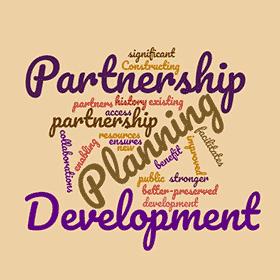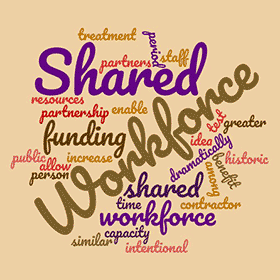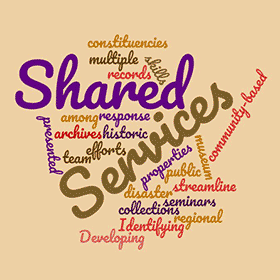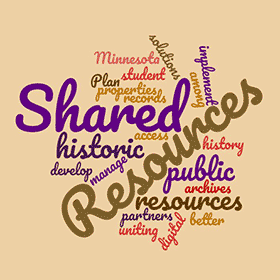Heritage Partnership Program
General information
This is a competitive grant program that funds capacity building and program development of history-based partnerships throughout the state. This state-funded program is made possible by the Arts and Cultural Heritage Fund using sales tax revenue resulting from the Clean Water, Land, and Legacy amendment created through the vote of Minnesotans on Nov. 4, 2008.
The goal of this grant program is to build the capacity of eligible applicants to preserve and enhance access to Minnesota’s history and cultural resources by supporting the creation and development of sustainable, history-based partnerships throughout the state. Two or more partners that are educational institutions, units of state or local government, nonprofit 501(c)(3) organizations and federally recognized tribes based in Minnesota are encouraged to apply.
Grants Office Webinar: Heritage Partnership Grants in 2025 can be your Second Chance
Partnership development and planning | Shared workforce | Shared services | Shared resources
Eligible applicants: Two or more partners that are eligible applicants, such as educational institutions, units of Minnesota state or local government, nonprofit 501(c)(3) organizations, and/or federally recognized tribes. Partners must have: 1) an active, vested interest in the program or partnership development, 2) contribute in some tangible way to accomplishing the goals, 3) have a common mission or purpose, and 4) all will benefit from the grant-funded work.
Availability of Funding: Applications are now being accepted for the Heritage Partnership Program. The schedule for the upcoming round is as follows:
| January 23, 2026 | Pre-application draft deadline, 11:59 pm. A pre-application is required to be eligible to submit a final application. |
| March 6, 2026 | Final application deadline, 11:59 pm |
| April 2026 | Grants Review Committee (GRC) meeting |
| May 2026 | MNHS Board Approval based on GRC recommendations and notification Letters are sent to all applicants |
| June 2026 | Grants Office prepares grant agreement (Grant period start and end dates will be listed in the grant agreement) and grantee signs agreement, returns to Grants Office |
| June 1, 2026 | Earliest beginning date for grant work |
| June 1, 2027 | Latest ending date on all grant work; these grants are not eligible for a time extension. |
Grant period: Heritage Partnerships Program grants must be completed within 12 months from the date of the award. Extensions for this grant program are not allowed due to state funding expiration dates. Therefore, applicants and partners need to plan accordingly to ensure that the grant concludes within 12 months.
Grant request range: The minimum grant is $10,000. There is currently no request cap. However, there is typically between $300,000 to $400,000 available each round to be awarded.
Match requirement: None; however, a match is encouraged. It is one indicator of local buy-in and commitment to the partnership grant. It is a criterion used for evaluating grant applications.
Eligible categories: The Heritage Partnership Program categories below include a suggested list of programs within each category. The list is not exhaustive and is meant only as a sample of possible programs. Some partnership programs might appear to fit under more than one category. If your planned program does not appear to fit into one of these categories, or if you are unsure which category should be applied to your program, contact the Grants Office before applying. The Heritage Partnership Program encourages applications for innovative partnership programs.
Partnership development and planning
Note: The Heritage Partnership Program is different than the Minnesota Historical & Cultural Heritage Grants Program, also funded through the Arts & Cultural Heritage Fund of the Clean Water, Land and Legacy Amendment to the Minnesota Constitution.
This category facilitates stronger collaborations between partners. Constructing a new partnership or enabling a significant development for an existing partnership ensures public benefit through better-preserved resources and improved access to history. Programs within this category are intended to build the networking and organizational capacity of the individual partners and the partnership as a whole.
Examples
- Forming a new partnership, including the development of organic documents and a long-range plan.
- Developing a strategic plan for coordinating history and cultural heritage preservation activities, educational curriculum, and events among partners.
- Hiring a facilitator for realignment discussions between two or more organizations considering integration of programs or governance.
- Contracting with a nonprofit service provider to develop leadership and/or train boards for a number of organizations.

Shared workforce
Partners may individually have similar needs that do not warrant hiring of full-time staff or contractors, but aggregating those functions for a temporary supplemental staff person or contractor might allow for a more intentional treatment of similar historic resources for greater public benefit. The funding for shared workforce is a onetime source of funding to enable a partnership to dramatically increase its capacity for a specified time period or to test the idea of a shared workforce among partners. The application must thoroughly demonstrate that the partnership has carefully planned how to evaluate success and sustain a shared workforce beyond the grant period.
Examples
- Hiring a coordinator to facilitate student access to Minnesota history at local history organizations and other history entities.
- Hiring a curator for multiple history museums to improve the quality of regional documentation.
- Hiring a site manager for multiple historic properties to forge a heritage tourism destination.
- Creating an internship program serving regional history entities.

Shared services
Partners may individually provide similar services to the public or contract with service providers to accomplish common goals. Streamlining services for greater efficiency will allow for a more comprehensive public benefit. The application must thoroughly demonstrate the partners and their customers will benefit from the shared service and that the partners can sustain the results of the shared services beyond the grant period.
Examples
- Contracting with a training provider to present skills seminars among multiple constituencies.
- Developing a regional or community-based team to streamline disaster response efforts for historic properties, public records, museum collections, or archives.
- Contracting with an interpretive specialist to create integrated heritage tourism or exhibits programs.
- Developing a plan to combine services for collections held among the partners, including digitization, storage, inventory, care, and access.

Shared resources
Partners may individually manage similar resources on behalf of the public. Streamlining management of those resources for greater efficiency will allow for a more comprehensive public benefit. The application must thoroughly demonstrate the partners and their customers will benefit from the compilation and sharing of resources. The partners must be able to sustain the results of the shared resources beyond the grant period.
Examples
- Develop a regional disaster response and recovery supply cache as part of a regional disaster team program (e.g., develop and purchase supplies for disaster kits).
- Plan, develop, and implement digital solutions for uniting historic resources to promote better public and student access to Minnesota history.
- Developing cooperative agreements and procedures to manage historic properties, public records, museum collections, or archives.
- Standardizing resources among partners, such as business forms, fee schedules, etc.

Application materials
Heritage Partnership Program Manual version 6.0 (PDF)
The Manual provides information about the Heritage Partnership Program. Use the manual to help you prepare your grant application. The manual also summarizes the requirements for administering grants.
Online application
All the application materials can be found on the Grants Portal. The portal provides access to everything you’ll need in administering a grant from the Minnesota Historical Society, from the pre-application stage through reporting on the completion of a grant. Here you will be able to track where an application is in the review process as well as have access to information about previous grants you have received. The portal allows you to save your work on an application and come back to finish it later.
Using the grants portal for the first time:
Go to the Grants Portal and click on “Create an account now” Complete and submit the form. You will receive an e-mail message within two business days about your request. Once you are registered, you will be able to log in and complete an application.
Required attachments
- Signature Authority Form: One of the partners must be identified as the lead partner for the application. This is done through the execution of the Signature Authority Form (Appendix D). The lead partner will be held responsible for coordinating the work, will serve as the fiduciary and project director, and must submit all required documentation, including final reports and requests for reimbursement.
- Existing partnership agreements: If the partnering organizations already have written legal agreements in place to govern the partnership, those documents must be submitted with the grant application.
- Nongovernmental organizations applying for over $25,000: The State of Minnesota Grants Policy (# 08-06) requires a review of the financial stability of nongovernmental organizations applying for grants of more than $25,000. To comply with this requirement, applicant organizations must submit an acceptable financial record as part of their application materials. Any items of significant concern must then be discussed and resolved to the satisfaction of Grants Office staff before a grant can be awarded. ACCEPTABLE RECORDS are Form 990, Form 990-EZ, Certified Financial Audit, or Year-End Financial Report.
Review criteria
The Heritage Partnership Program is a competitive process involving application review by Grants Office staff, the Minnesota Historical Society’s standing Grants Review Committee (GRC), and the Minnesota Historical Society’s Executive Council. Applications are scored in consideration of whether the partnership program builds capacity within all of the partners, fills a demonstrated need, produces measurable outcomes, incorporates public benefit and access to Minnesota’s history and cultural heritage resources, has enduring value, and is sustainable.
Review process
Pre-Applications: A pre-application is submitted through the grant portal by the deadline date. Eligible pre-applications are reviewed by Grants Office staff and other Minnesota Historical Society subject area experts. Constructive feedback will be provided to the applicant to improve their final application. Applicants are encouraged to contact Grants Office staff if they have any questions about the feedback received.
Final applications: Eligible final applications are reviewed by Grants Office staff and other Minnesota Historical Society subject area experts. Eligible final applications, along with staff review comments, are sent to the Grants Review Committee for consideration at a public meeting. You will receive notice of the meeting and will be invited to make a three-minute presentation supporting your application. Such presentations are not required; your application will be given full consideration whether or not you make a presentation.
Based on their evaluation and the review criteria, the Grants Review Committee recommends approval or denial of each application and forwards their recommendations to the Minnesota Historical Society Executive Council for final action. You will be notified of their decision in writing. In some cases, special conditions may be required on approved programs; the conditions will be outlined in your grant agreement.
Award and denial notifications are sent out approximately 12 weeks after the final application deadline.
Note: The Heritage Partnership Program is different than the Minnesota Historical & Cultural Heritage Grants Program, also funded through the Arts & Cultural Heritage Fund of the Clean Water, Land and Legacy Amendment to the Minnesota Constitution.
Contact us
Call 651-259-3497 or e-mail grants@mnhs.org if you have questions about the above grant program or need assistance with your application.
The Grants Office offers workshops throughout the year focused on different topics regarding all our grant programs. To find out more, visit the Events page .